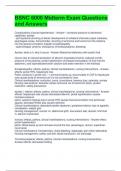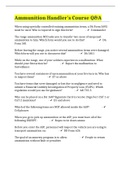BSNC 6000 Midterm Exam Questions
and Answers
Complications of portal hypertension - Answer-- increased pressure in peritoneal
capillaries: ascites
- port-systemic shunting of blood: development of collateral channels (caput medusae,
esophageal varies, hemorrhoids), shunting of ammonia and toxins from the intestine
into the general circulation (hepatic encephalopathy
- splenomegaly (anemia, leukopenia, thrombocytopenia, bleeding)
Ascites: what is it, why it occurs - Answer-Abdominal distention with ascitic fluid
Occurs due to reduced production of albumin (hypoalbuminemia, reduced oncotic
pressure of the plasma), portal hypertension (increased transudation of fluid into the
abdomen), and hyperaldosteronism (sodium and water retention in the kidneys)
Encephalopathy: effects, pathos, clinical manifestations, nursing interventions - Answer-
effects: portal HTN, hepatocyte loss
Patho: pressure in portal vein --> ammonia backs up, accumulates in CSF & hepatocyte
loss causes build of ammonia as it is not converted to urea
Clinical manifestations: confusion, coma, convulsions, memory loss, asterisks, anxiety
Nursing interventions: lactulose (draws ammonia out of blood into stool), protein
restriction, safety precautions
ascites + edema: effects, pathos, clinical manifestations, nursing interventions - Answer-
effects: hepatocyte loss causes decreased albumin, portal hypertension causes
increase pressure
patho: systemic backup due to portal HTN causes fluid accumulation into peritoneal
spaces, decrease RAAS also causes retention
Clinical manifestations: distended swollen abdomen, peripheral edema, loss of appetite,
constipation, weight gain
Nursing management: monitor i/o, abdominal girth, low sodium diet, diuretic, limit fluid
in, albumin transfusion
Varices: effects, pathos, clinical manifestations, nursing interventions - Answer-effect:
portal hypertension
patho: blood backs up and reroutes around the liver (esophagus, rectum, superficial
naval area)
Clinical manifeations: hematemesis, rectal bleeding, dysphagia, pain when defecating
Nursing management: safety, soft diet, blood transfusion, d/c anticoags
Thrombocytopenia: effects, pathos, clinical manifestations, nursing interventions -
Answer-effects: decreased clotting
,patho: due to portal hypertension, blood backed up in spleen destroys platelets
clinical manifestations: bruising/bleeding, splenomegaly, low platelet count
Nursing management: fall precautions, cluster care, d/c anticoags, platelet transfusion
Hypoglycemia: effects, pathos, clinical manifestations, nursing interventions - Answer-
effects: low glucose
patho: due to hepatocyte loss as glycogenolysis cannot occur if there is decreased
blood glucose & gluconeogenesis can't occur as glucose can't be formed from fatty
acids and proteins
clinical manifestations: fatigue, confusion, sweating, tremors, dizziness, tachycardia,
reduced concentration , low BG reading
nursing interventions: sugar water, food, dextrose IV
Vitamin deficiency: effects, pathos, clinical manifestations, nursing interventions -
Answer-effect: loss of hepatocytes, portal htn
patho: lack of processing + storing due to loss of hepatocytes, phtn causes resistance
which prevents blood form go tract from entering liver
clinical manifestations: fatigue, decreased immunity (b12), anemia, bleeding, low mood,
loss of bone density, muscle weakness (vit d), increase inr and put
Nursing management: IV and IM vit supps
Gynecomastia + testicular atrophy: effects, pathos, clinical manifestations, nursing
interventions - Answer-effects: hepatocyte loss
Patho: responsible for deactivating sex hormones and creating plasma proteins (ex.
albumin) that helps transport sex hormones in the blood, thus increase estrogen and
decrease testosterone
Clinical manifestations: breast tissue enlargement (males only), shrinking of testacles,
menstrual disturbances, infertility (both)
Nursing interventions: hormone therapy (not replacement), provide support, cycle
tracking
Drug detoxification/interaction: effects, pathos, clinical manifestations, nursing
interventions - Answer-effects: hepatocyte loss, fatty tissue build up
patho: chronic drug use/toxicity causes liver to no longer convert toxins into less toxic &
excitable form (ex. ammonia)
clinical manifestations: n/v, tremors, fatigue
Nursing management: iv fluids, avoid PO (first pass effect)
The following questions pertain to the medication's interaction with impaired liver
function - Answer-:(
ASA - Answer-pts with liver cirrhosis often have low platelets → discontinue due to
potential bleed
, Furosemide - Answer-continue for patients with impaired liver function, however,
discontinue in those with impaired renal function (potential for nephrotoxicity (low BUN
and creatinine)) → replace with spironolactone
Metoprolol - Answer-helps with portal hypertension, but hold if patient has low BP
Ramipril - Answer-helps with portal hypertension, vasodilation helps heart to pump
Warfarin - Answer-discontinue in those with impaired liver function due to risk of
bleeding, however important for a-fib?
Metformin - Answer-discontinue due to hepatotoxicity, instead administer
insulin/linagliptin
Atrovent - Answer-not contraindicated in impaired liver function (bronchodilation →
helps with COPD)
Salbutamol - Answer-not contraindicated in impaired liver function (bronchodilation →
helps with COPD)
Lactulose - Answer-used in patients with impaired liver function, works by drawing
ammonia from the blood into the colon to be excreted, preventing the development of
hepatic encephalopathy (accumulation of toxins/ammonia in the brain, can be life
threatening)
Multivitamin - Answer-continue in patients with impaired liver function, but monitor lab
values of fat soluble vitamins (A, D, E, K)
Thiamine - Answer-continue as only small amounts are stored in liver, and with impaired
function, insufficient amount may be stored
Pantoprazole - Answer-weigh risks and benefits → helps prevent erosion of stomach
mucosa, especially important during GI bleed, can be hard on liver and kidneys
however
Magnesium and phosphate - Answer-depends on corresponding lab values (typically
low)
Metoclopramide - Answer-often used in patients with liver cirrhosis, anti
nausea/vomiting
Acetaminophen - Answer-administer in low doses (typically max 1950mg per day), as
cirrhosis lowers dose threshold, potentially causing toxicity
Ibuprofen - Answer-discontinue, increases risk of bleeding, replace with low dose
acetaminophen





